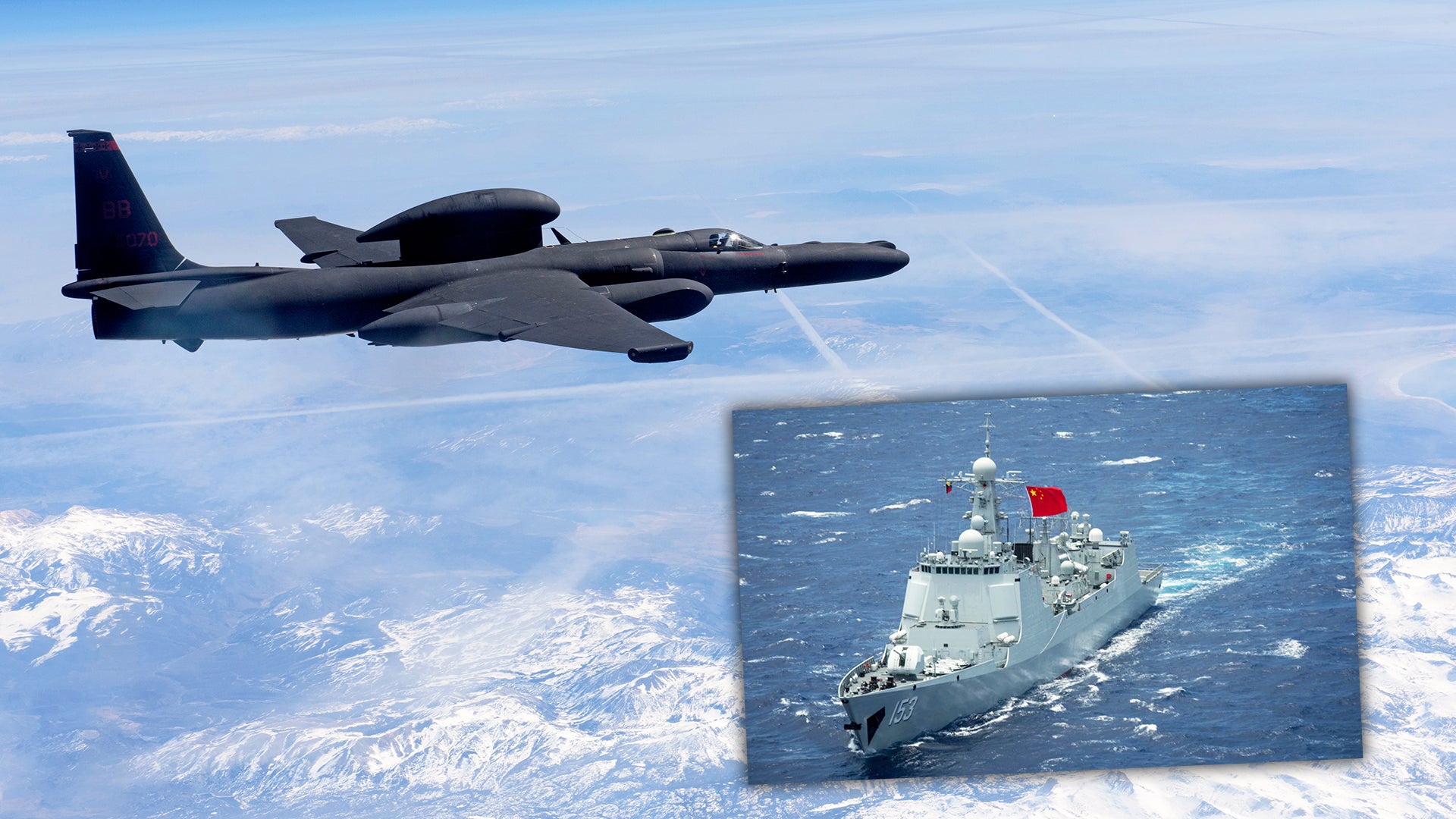China is making a big deal out of a supposed overflight by a U.S. Air Force U-2 spy plane of one of its currently underway People’s Liberation Army Navy (PLAN) exercises. It isn’t clear where exactly the incident is claimed to have taken place as China has four major naval wargames underway in the South China Sea, Yellow Sea, East China Sea, of Sea of Bohai right now. The northeastern reaches of the South China Sea, in particular, has experienced a massive uptick in military activity in recent weeks, with Chinese forces and U.S. forces flooding the area with military capabilities. The U.S. has placed a near-constant stream of surveillance aircraft over the area and Taiwan has raised its alert status due to the activity level of PLAN assets. The latest Chinese drills in that region are slated to run from the 24th to the 29th, but in the case of the supposed U-2 mission in question, the Yellow Sea exercises seem most likely where the high flying spy aircraft crashed the PLAN’s party.
U-2s sortie out of Osan Air Base in South Korea, making the trip west to the Yellow Sea local in nature. China also says the incident occurred in an area that was under its Northern Theater Command’s responsibility, pointing to exercises in this area. The U.S. still hasn’t confirmed the mission took place or responded on any level to China’s accusations.
According to Reuters, China says its Defense Ministry has lodged ‘stern representations” with the U.S. government over the U-2 “seriously interfering in normal exercise activities” that could have resulted in an “unexpected incident.” They added that the flight was “an act of provocation, and China is resolutely opposed to it… China demands the U.S. side immediately stop this kind of provocative behavior and take actual steps to safeguard peace and stability in the region.”
While China can issue a notice to airmen (NOTAM) warning of live-fire drills, the vast majority of the exercise would have taken place in international waters. So, the U-2 may have waltzed into or near China’s air defense identification zone, and the airspace it ‘closed’ for the exercise, but that doesn’t mean it broke any territorial boundaries.

Still, doing so is undoubtedly a bold move. If China was executing live-fire drills, placing an aircraft in that area ups the risk of a mistake being made. Still, they could see the U-2 coming from far away and the aircraft has one of the world’s most capable electronic warfare self-protection suites. The potential payoffs of pushing one of these spy planes directly over or near a Chinese live-fire naval exercise are also quite high. The aircraft could suck up all of the PLAN’s radar, data-links, and other communications signatures, as well as eavesdrop on its voice communications and monitor its operational procedures. Just how the PLAN would respond to the U-2 being there and what sensors would track it could dramatically increase the fidelity of this intelligence value, as well. In other words, it would both stimulate and surveil the PLAN’s integrated air defense capabilities.
It’s also worth noting that China has no fighter aircraft capable of physically intercepting a U-2 and harassing it. That doesn’t mean they don’t have the capability to shoot one down though, but an incident like the one that occurred off of Hainan Island in 2001, which involved a much lower-flying U.S. Navy EP-3E Aries II spy plane, wouldn’t be a factor when employing a U-2.

As it sits now, China looks set to potentially execute a major test of its anti-ship ballistic missile capabilities in the coming hours and days. This would be a relatively large development as these anti-access/area-denial long-range weapons are among the most mysterious yet feared capabilities in China’s arsenal, ones aimed squarely at U.S. carrier strike groups that frequent the region. The People’s Liberation Army reportedly conducted a similar ballistic missile exercise last year, which also involved firing the weapons into the South China Sea from areas deep within the mainland.
It will be interesting to see if China responds to this overflight militarily. The Chinese military has its own stable of high-altitude, long-endurance aircraft, unmanned ones, that it could send over U.S. carrier strike groups, but doing so could give away certain vulnerabilities in their sensors and data-links. Still, that would be the closest thing China has to a direct response at this time.
Regardless of what comes next as part of China’s big summer rush of naval exercises, if this mission did indeed take place, it would be clear that the U.S. military is upping the invasiveness of its surveillance flights near PLAN operations and also heightening the risk it is willing to take on in the process. It serves as yet another sign of the growing unease between the two superpowers.
Beyond that, it’s amazing to think that America’s 65 year-old-spyplane is still drumming up international incidents after so many years.
Contact the author: Tyler@thedrive.com
